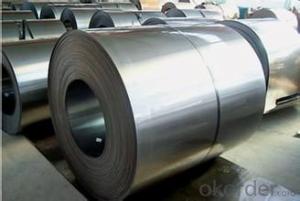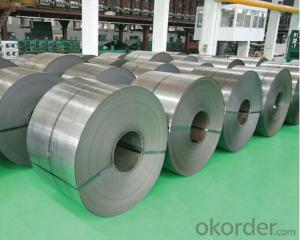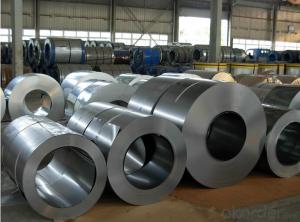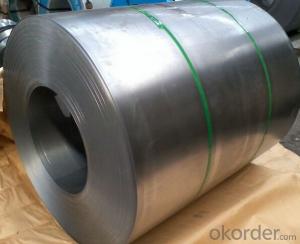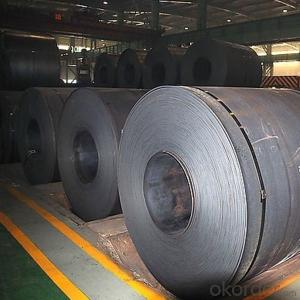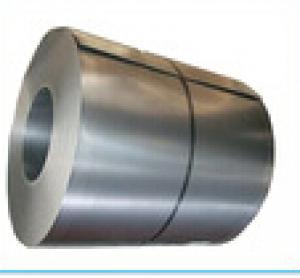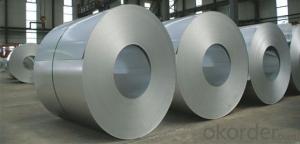Cold Rolled Steel of High Quality of China
- Loading Port:
- Tianjin
- Payment Terms:
- TT OR LC
- Min Order Qty:
- 100 m.t.
- Supply Capability:
- 10000 m.t./month
OKorder Service Pledge
OKorder Financial Service
You Might Also Like
1.Structure of Cold Rolled Steel Description:
The raw material of cold rolled steel coil/sheet is high quality hot rolled product, and after pickling continuous rolling, degreasing, annealing,skin pass,slitting and cut to length line etc. Along with it many kinds of new technology and new process of global cold rolling production have been applied. Therefore the quality of the goods could be guaranteed. The product is widely used in outdoor and interior decoration, furnishing manufacturing, home appliance, automobile etc.
2.Main Features of the Cold Rolled Steel:
• Excellent process capability
• Smooth and flat surface
• Workability, durability
• Excellent heat resistance performance
• High strength
• Good formability
• Good visual effect
3.Cold Rolled Steel Images
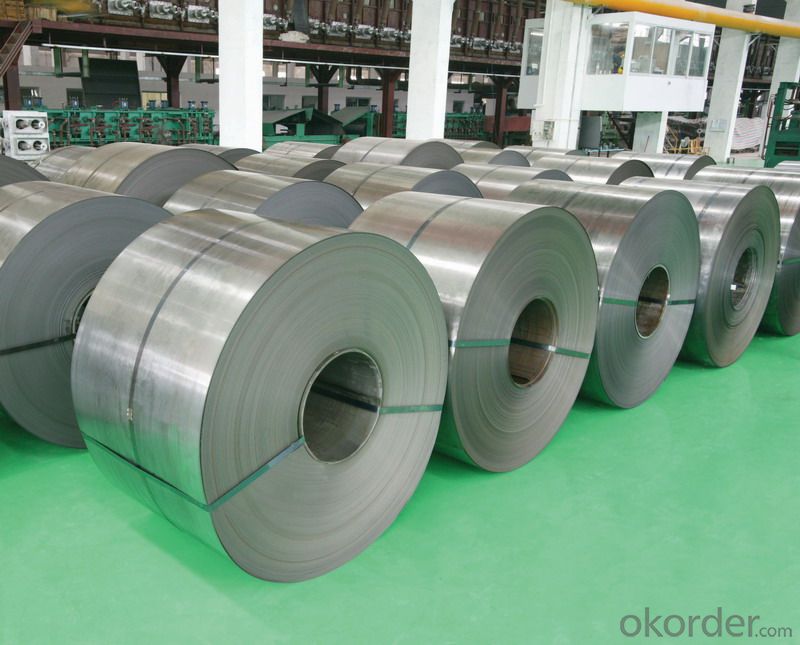
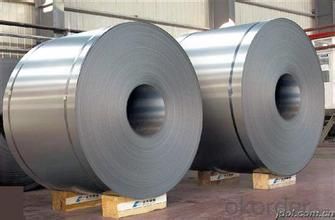
4.Cold Rolled Steel Specification
Standard:AISI,ASTM,DIN,GB,JIS,JIS G3302 ASTM 653M EN10142
Grade: Q195~Q345
Thickness: 0.16mm~1.5mm,0.16-1.5mm
Width: 1250,600-1250mm
Coil weight:3-12 MT
Coil ID:508/610mm
Chemical composition:
C | Si | Mn | Cr | Ni | P | S |
0.150 | 0.476 | 11.231 | 12.50 | 0.900 | 0.039 | 0.010
|
5.FAQ of Cold Rolled Steel
We have organized several common questions for our clients,may help you sincerely:
1.How about your company?
A world class manufacturer & supplier of castings forging in carbon steel and alloy steel,is one of the large-scale professional investment casting production bases in China,consisting of both casting foundry forging and machining factory. Annually more than 8000 tons Precision casting and forging parts are exported to markets in Europe,America and Japan. OEM casting and forging service available according to customer’s requirements.
2.How to guarantee the quality of the products?
We have established the international advanced quality management system,every link from raw material to final product we have strict quality test;We resolutely put an end to unqualified products flowing into the market. At the same time, we will provide necessary follow-up service assurance.
3. How long can we receive the product after purchase?
Usually within thirty working days after receiving buyer’s advance payment or LC. We will arrange the factory manufacturing as soon as possible. The cargo readiness usually takes 15-25 days, but the shipment will depend on the vessel situation.
- Q: How does the thickness of a steel coil affect its applications?
- The thickness of a steel coil affects its applications by determining its strength, durability, and versatility. Thicker steel coils are typically stronger and more resistant to bending or deformation, making them suitable for heavy-duty applications such as construction projects, automotive manufacturing, and infrastructure development. Thinner steel coils, on the other hand, are more flexible and easier to shape, making them ideal for applications that require intricate designs or a lightweight material, such as in the production of electronics, household appliances, or packaging materials. Ultimately, the thickness of a steel coil plays a crucial role in determining its suitability for specific applications based on the desired strength, flexibility, and weight requirements.
- Q: What is the process of slitting steel coils into narrower strips?
- The process of slitting steel coils into narrower strips involves unwinding the steel coil and passing it through a set of rotating circular blades. These blades cut the coil into narrower strips of the desired width. The strips are then rewound onto separate coils or packaged for further processing. This slitting process allows for the production of multiple narrower strips from a single large coil, making it more versatile and efficient for various applications.
- Q: How are steel coils used in the manufacturing of agricultural implements?
- Steel coils are used in the manufacturing of agricultural implements by being shaped and formed into various components such as blades, tines, and frames. These components are then assembled or attached to the implements, such as plows, harrows, and cultivators, to enhance their durability, strength, and performance in agricultural activities.
- Q: What are the main factors that affect the price of steel coils?
- The main factors that affect the price of steel coils include the cost of raw materials such as iron ore, coal, and other alloys, supply and demand dynamics in the steel industry, production and transportation costs, fluctuations in currency exchange rates, and government policies and regulations. Other factors such as global economic conditions, trade tariffs, and market competition also play a significant role in determining the price of steel coils.
- Q: How are steel coils used in the aerospace industry?
- Steel coils are used in the aerospace industry for various applications such as manufacturing aircraft components, including structural parts, engine components, and landing gear. These coils are often processed and formed into sheets, plates, or other desired shapes to meet the specific requirements of aerospace engineering. The high strength and durability of steel make it an ideal material for withstanding the demanding conditions and stresses experienced by aircraft during flight.
- Q: How are steel coils used in the manufacturing of pipes and tubes?
- Steel coils are used in the manufacturing of pipes and tubes by being formed and shaped into the desired dimensions and then welded or seamless to create the final product. The coils provide a continuous and consistent source of steel material, ensuring high-quality and reliable pipes and tubes.
- Q: How are steel coils inspected for defects?
- To ensure the quality of steel coils meets required standards, various methods are used to inspect them for defects. Visual inspection is a common method, where trained inspectors examine the coil's surface for visible defects like cracks, scratches, or dents. This can be done through direct observation or with the help of magnifying tools. Another method is magnetic particle inspection, which detects surface and near-surface defects like cracks or voids. Here, a magnetic field is applied to the coil, and magnetic powder is spread on the surface. If any defects are present, the powder will be drawn to them, making them visible to the inspector. Ultrasonic testing is also commonly employed to inspect steel coils for defects. It involves transmitting high-frequency sound waves into the coil and analyzing the reflected waves. Any deviations in the sound waves can indicate the presence of defects like cracks or voids within the coil. Eddy current testing is another method used to detect defects in steel coils. It works by using electromagnetic induction to generate eddy currents within the coil. Any changes in these currents caused by defects in the material are detected and analyzed by the inspector. Finally, in some cases, destructive testing is performed on steel coils. This involves taking a sample from the coil and subjecting it to tests such as tension or bend testing. These tests evaluate the mechanical properties of the steel and indirectly indicate the presence of defects. Overall, a combination of visual inspection, magnetic particle inspection, ultrasonic testing, eddy current testing, and potentially destructive testing is used to inspect steel coils for defects. These methods ensure that any defects are identified and addressed, guaranteeing the delivery of high-quality steel coils to customers.
- Q: I have the game of the year edition for fallout 3 but there's no mission or quest saying it's called broken steel so what is it actually called and where is it? Please describe the quest in case I mightve already done it without even knowing.
- If I can remember right (SPOILER) you have to beat the game and instead of dying you just pass out and wake up with the brother hood of steel.
- Q: Can steel coils be stacked on top of each other?
- Yes, steel coils can be stacked on top of each other.
- Q: How are steel coils tested for strength?
- Steel coils are typically tested for strength through a variety of methods, including tension, compression, and bending tests. These tests involve subjecting the coils to various levels of force to determine their resistance and ability to withstand pressure without deformation or failure. Additionally, non-destructive techniques such as ultrasonic or magnetic particle testing may be employed to detect any imperfections or weaknesses within the coils.
Send your message to us
Cold Rolled Steel of High Quality of China
- Loading Port:
- Tianjin
- Payment Terms:
- TT OR LC
- Min Order Qty:
- 100 m.t.
- Supply Capability:
- 10000 m.t./month
OKorder Service Pledge
OKorder Financial Service
Similar products
Hot products
Hot Searches
Related keywords
